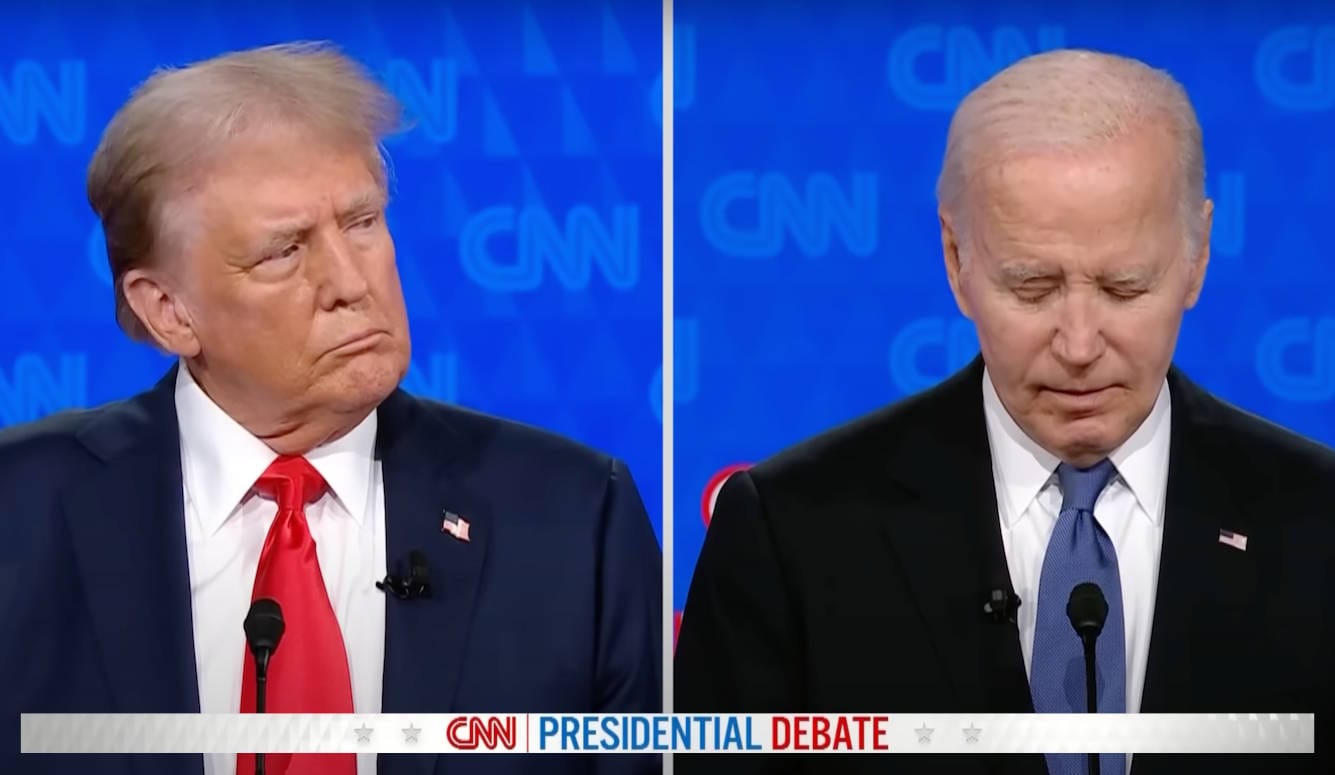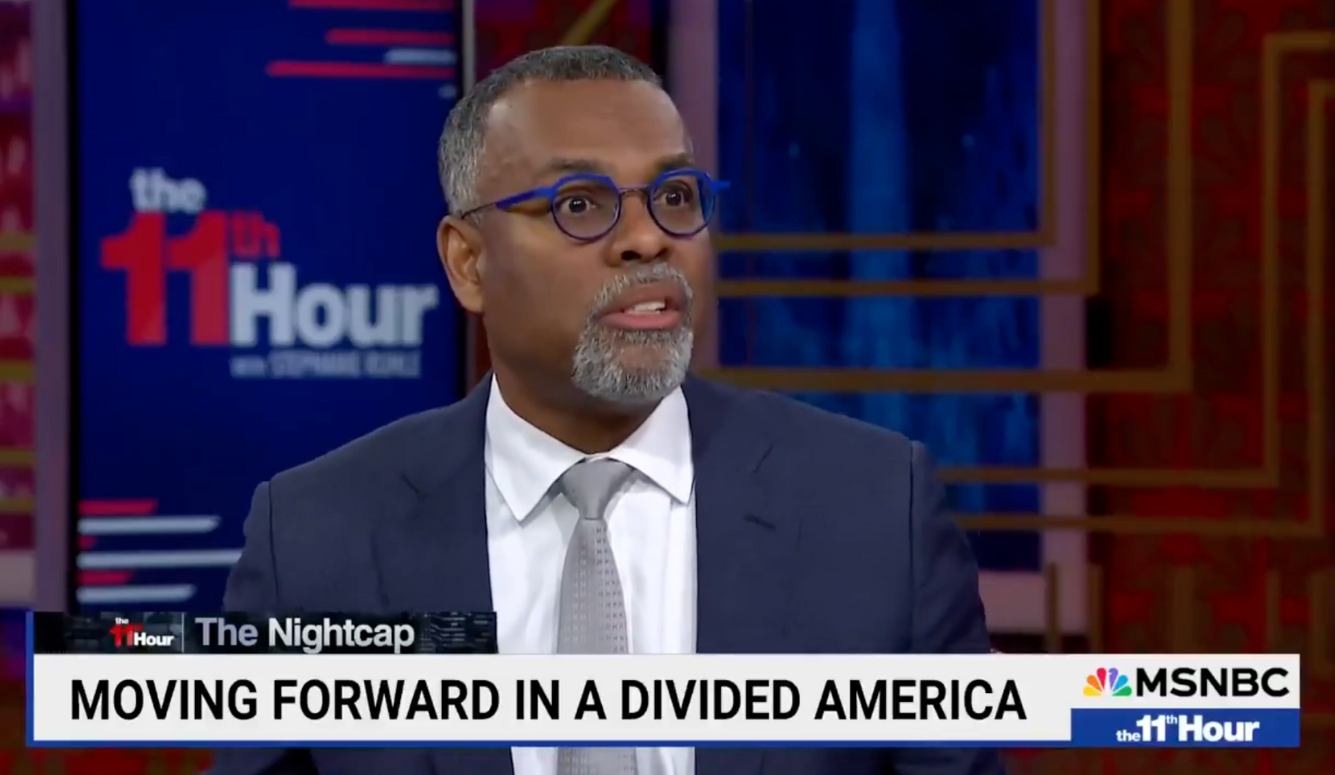Politics
A Bridge Too Far
Biden’s re-election campaign was a grand exercise in hubris, which led to the very outcome it was intended to prevent.

A review of Original Sin: President Biden’s Decline, Its Cover-Up, and His Disastrous Choice to Run Again by Jake Tapper and Alex Thompson, 352 Pages, Penguin Random House (May 2025)
The befuddled old man who stumbled so pitifully through his 2024 debate with Donald Trump that he was forced to withdraw from the presidential race was not unfamiliar to those around him. As Jake Tapper and Alex Thompson demonstrate in Original Sin: President Biden’s Decline, Its Cover-Up, and His Disastrous Choice to Run Again, those near President Joe Biden had been seeing and hearing this version of him for some time.
This raised two questions. First and most obviously, could this man be relied upon to serve as Americans’ commander in chief? A second and more subtle question woven into Tapper and Thompson’s account concerns the ideological direction in which Biden’s presidency moved—did his administration drift from his own lengthy political history and his stance as a presidential candidate because others were acting in his name or manipulating him?
Biden’s cognitive impairment was not only apparent to his staff during that disastrous live debate with Trump in June, it was also obvious in the privacy of the campaign’s own studios. Cutting footage for ads or other campaign use became a challenge, notwithstanding the tricks of video editing. “When they recorded videos,” Tapper and Thompson write, “much of the footage was unusable. ‘The man could not speak,’ said one person involved. It wasn’t his stutter; it was his inability to find words, to remember what he was saying, to stay on one train of thought.”
His camp decided that while this was an impediment to campaigning, it need not compromise his ability to govern. The ship of state could be steered by three aides who had “worked with Biden for many years, if not decades” whom Tapper and Thompson dub the “politburo”: Mike Donilon, Steve Ricchetti, and Bruce Reed. In addition, chief of staff Ron Klain, though newer to the team, may have been the most powerful of all. “‘Five people were running the country, and Joe Biden was at best a senior member of the board,’ said one person familiar with the internal dynamic.” This arrangement, Tapper and Thompson report, was rationalised as follows:
“He just had to win, and then he could disappear for four years—he’d only have to show proof of life every once in a while,” said one longtime Biden aide. His aides could pick up the slack. “When you vote for somebody, you are voting for the people around them too,” the aide argued.
The justification for this Potemkin presidency was straightforward: the alternative—another term for Donald Trump—was unthinkable. Trump had attempted to steal the 2020 election and he was now openly promising a presidency of “retribution” were he to be re-elected. However, the strategy Biden’s team used to repulse this spectre amounted to a grand exercise in hubris, which led to the very outcome it was intended to prevent.
The hubris was, in the first instance, Biden’s own. He may not have understood the dimensions of his own frailty, but he knew he was not the man he once was, and there was no reason for his belief that only he could defeat Trump. Then Biden’s hubris was compounded by that of his aides. Not one American in a hundred knew the names Donilon, Ricchetti, Reed, and Klain. Despite what an unnamed aide told Tapper and Thompson, Americans had not in fact voted for them. Of course, voters know that every high official has aides, but the issue in this case was the degree to which these aides were fulfilling the duties of a president who was no longer able to do so himself.

In 2020, Biden had made himself a hero to Democrats by defeating Trump. Party heavyweights had tabbed him as the person most likely to achieve that critical mission. Biden had twice before sought to be his party’s candidate, in 1988 and 2008, only to be knocked out early in the election cycle. At first, 2020 looked like it would be his third strike. He finished fourth in Iowa and fifth in New Hampshire, foretelling yet another failed run. But the early success of Bernie Sanders, a figure of the radical Left who was not even an official Democrat, alarmed the Democratic establishment. When other candidates who presented as moderates failed to gain traction, the party leadership threw its weight behind Biden despite his early stumbles, persuading others to drop out and unite the moderate camp.
The party establishment feared that if Sanders were nominated he would lead Democrats up and down the ballot to a crushing defeat, President Trump’s unpopularity notwithstanding. Biden, a congenial generic Democrat, would play well against the mercurial incumbent and rescue the country from a second Trump term that threatened to be even more volcanic than the first. Biden seemed to understand his assignment. “I view myself as a bridge, not as anything else,” he said, and aides told reporters that it was “virtually inconceivable that he will run for reelection in 2024, when he would be the first octogenarian president.”
Three years later, however, Biden and his aides were singing an altogether different tune. For all their interesting revelations, Tapper and Thompson shed little light on the thinking behind this change of heart. They suggest that Biden’s son Hunter and First Lady Jill may have encouraged it. If so, it is easier to understand the motives of the former, who cashed in on his father’s presidency, than the latter. “All [Jill] ever wanted to do was love Joe,” Tapper and Thompson write. But then why didn’t she do more to preserve him? The arduous demands of the office have visibly aged one after another of the men who have held it, and the strain was already evident on Biden as he approached the end of his first term. The Biden of 2023 was visibly changed from 2020. Even before his prostate cancer diagnosis was revealed, it was unlikely he would survive until 2029 when his second term concluded.
Had Biden kept to his role as a “bridge,” an open contest for the 2024 nomination might have yielded a Democrat less tainted by inflation, immigration, and other administration failures that led most voters to say that the country was “on the wrong track.” Trump remained disliked by most voters and ought to have been beatable had the Democratic Party nominated a strong candidate. Instead, Biden clung to the conceit that, despite the public’s view, he was a historically great president and the only Democrat who could beat Trump.

Biden’s team also believed he could win but they were anxious. They knew that allowing their candidate to participate in a live debate was risky. The date of that encounter was moved forward to June—earlier than normal—at their behest, precisely so that there would be plenty of time to recover if Biden faltered, as they feared he might. They did not foresee, however, that the event would be such a fiasco that it would impel the party establishment to force his withdrawal from the race entirely and find a hasty replacement.
That replacement was Vice President Kamala Harris who went on to lose every swing state to Trump in the presidential election. In the season of recrimination that ensued among Democrats following that defeat, Harris’s camp pointed a finger of blame at Biden. Had he withdrawn sooner, she would have had more time to campaign. David Plouffe, the seasoned operative who helped run the Harris campaign, complained to Tapper and Thompson, “We got so screwed by Biden as a party.”
After an initial flurry of excitement when Harris replaced Biden at the top of the ticket, her poll numbers against Trump trended steadily downward until Election Day. With a longer campaign, she might have lost by more.
Would more time have helped? The public had observed her performance as Vice President, and her ratings were even further underwater than Biden’s. After an initial flurry of excitement when she replaced Biden at the top of the ticket, her poll numbers against Trump trended steadily downward until Election Day. With a longer campaign, she might have lost by more. Tapper and Thompson refer to her as an “untested nominee,” but that is not entirely true. She had been tested in 2020 when she campaigned for the Democratic nomination and attracted so little support that she was forced to drop out before the first primary. And Tapper and Thompson report that Harris was no more attractive up close than she was to the electorate at large:
To the Biden team, Harris was a regular headache. She often shied away from politically tough assignments [and] even turned down seemingly simple tasks, such as headlining DC’s Gridiron Club dinner. She had considerable turnover, as her aides tired of what they called her “prosecuting the staff” style. ... Many on the Biden team felt that Harris didn’t put in the work and was also just not a very nice person.
When, in a blink, Biden’s debate performance convinced some Democratic leaders that he must be replaced as the nominee, the idea was bruited of an open and competitive selection process. Tapper and Thompson report that Barack Obama and Nancy Pelosi favoured this approach. The primaries and caucuses could not be rerun, but there would be nearly 5,000 delegates to the national convention, the panoply of party leadership across all levels. Almost all these delegates had been pledged to Biden, but if he withdrew, they would become independent agents. Various presidential aspirants could throw their hats in the ring; debates could be organised; and these party stalwarts and activists could choose among the new contenders.

Tapper and Thompson suggest that the weeks lost while Biden dithered, not to mention Biden’s immediate endorsement of Harris when he finally withdrew, foreclosed this option. But it is not obvious that these few weeks were decisive nor that Biden couldn’t have been dissuaded from a hasty anointment. There was, however, another obstacle to the open-choice plan for replacing Biden. Tapper and Thompson cite Mark Warner, the moderate Democratic Senator from Virginia:
It had become evident, Warner believed, that Vice President Harris would have to be the nominee, not least because the most loyal Democratic voters were African Americans, particularly African American women. The senior Democratic African American constituency in Congress was making that very clear.
The original choice of Harris as Biden’s running mate had been surprising in some ways. She had performed terribly in the presidential campaign of 2020. Her only notable moment was in the first Democratic candidates’ debate, when she accused Biden of pandering to white racism. And she brought no geographic benefit, since she came from California, a state the Democrats were certain to carry no matter who was on the ticket.
But Kamala Harris was black and female (and half Asian, to boot). Biden pledged early that his running mate would be a woman. And the black vote had played a large role in delivering the South Carolina primary to Biden, eclipsing his poor showing in Iowa and New Hampshire, and serving as his springboard to the nomination. This made it all but certain that the VP nominee would be a black woman. The press reported that Biden’s shortlist comprised Harris, Congresswomen Karen Bass of California, and Val Demings of Florida.
Tapper and Thompson dispute this. They claim the final choice came down to Harris and Michigan Governor Gretchen Whitmer. They even report that Biden felt more sympatico with Whitmer (and little wonder after Harris had painted him as a racist in front of a large television audience). But had he chosen a white running mate it would have roiled the party, especially after Representative Jim Clyburn, who was widely credited with having mobilised South Carolina’s black voters for Biden, made public his wish for a black woman in the number two slot. Identity politics had become the Democrats’ signature.
Harris was the sole black woman serving in the Senate, and none were governors. Neither Bass nor Demings nor any other mere Member of Congress lacking a national reputation seemed as plausible for the ticket. But the choice of Harris in 2020 was like a lobster trap: tempting to slide into but then impossible to escape. Had the party dumped her in 2024 in favour of a white woman or a man or—worst of all—a white man, it almost surely would have alienated some voters even if that candidate had attracted others. And this conundrum was emblematic of a larger dynamic that Tapper and Thompson hint at only briefly.
Original Sin focuses on indicting the Biden entourage for perpetrating a deception: telling the country that Biden was up to performing the role of president for four more years when they knew he was not. Like most people losing acuity with age, Biden functioned better at some times of the day that at others. Perhaps he could handle a crisis at mid-afternoon, but what if it hit in the middle of the night? Beyond the general question of his clarity and stamina, however, there was another matter of deception no less consequential and no less reprehensible. It had to do not with the frailties of the human body but with political ideology.
When the party establishment rallied behind Biden in 2020 to thwart the radical campaign of Bernie Sanders, Biden presented himself as a moderate, ostentatiously shunning key progressive stances that his competitors embraced in the televised Democratic debates. During the summer of 2020, the country was convulsed with protests and riots ignited by the death of George Floyd in police custody. But while activists clamoured for American police departments to be “defunded,” Biden sent the country a message of moderation by distancing himself from the left of his party: “Do I look like a radical socialist with a soft spot for rioters?” he asked rhetorically.
Donald Trump had been an extraordinarily divisive president, and a large part of Biden’s appeal was his promise to end polarisation by governing as a president “who will heal this country.” This necessarily meant tacking to the centre. But beneath the radar, he was already heading in the opposite direction. No sooner had he locked up the nomination than his campaign announced that it had formed joint task forces with Sanders to shape the Democratic platform. This might have raised more eyebrows were party platforms not widely regarded as empty rhetoric, and the gesture was generally written off as a sop to voters and activists on the left of the Democratic Party.
But in the event, write Tapper and Thompson, these task forces positioned the Biden presidency “to the left of where Biden had been for most of his career” and set down a marker that guided the next four years. They single out the ideological influence of chief of staff Ron Klain, who “steered and staffed the White House in a way that seemed contrary to Biden’s centrist reputation. Klain would say he was merely trying to enact the bold progressive agenda that the president had campaigned on.” But Klain had helped to shape that campaign; he was reportedly one of the engineers of the Biden/Sanders “joint task forces.”
Klain, Tapper and Thompson write, was also among the small inner group pushing for the selection of a black woman as Biden’s running mate and then weighing in for Harris. Many observers thought that Harris disqualified herself by attempting to stigmatise Biden as an enabler of white racism. But Klain argued that Biden would demonstrate “grace” by choosing her in spite of that sally. Tapper and Thompson describe Klain as “one of the most powerful chiefs of staff in modern history. Republicans taunted Biden by calling Klain ‘the prime minister,’ but people inside the White House sometimes quietly called him that too.”
A month into Biden’s presidency, the Daily Beast published a report titled “How Progressives Are Building Power in the Biden White House,” which cited “key alliances forming behind the scenes between the White House and passionate liberals on the outside.” The article elaborated:
Klain’s frequent communications with top leaders on the left is part of a critical, emerging infrastructure within the White House. The goal, described by three White House officials, including the chief of staff, is not only to elevate their ideas and concerns, but to make them a permanent part of the policy making process.
Two years later, Politico reported: “Progressives credit Klain with ... building out an apparatus that’s put liberal allies in positions of power across government.” When Klain stepped down as chief of staff in 2023, the New Republic reported that “progressive activists” viewed him “as something between a trusty liaison and an inside-man ally in the White House.” Whichever it was, Klain was clearly the spearhead of progressive influence within the administration. But neither Tapper and Thompson, nor others of whom I am aware, have suggested that he met resistance from within the “politburo” or from the Biden family or from Biden, himself. Had Biden evolved ideologically in his eighties? Or was he largely a passive member of his own administration carried along by the positions of Klain and other top staff?

On his first day in office, Biden signed seventeen Executive Orders and other decrees. In his first 100 days, he signed 52, more than any president since Harry Truman. Some of these addressed America’s COVID-19 epidemic or reversed controversial actions of the preceding Trump administration, while others set forth detailed policies on matters of immigration, the environment, and gender identity. For example, one of these orders barred workplace discrimination based on sexual orientation or gender identity. Another demanded that school systems around the country allow students to participate in sports and all other activities based on their gender identity. A third established a White House Gender Policy Council tasked with formulating a government-wide plan within 200 days to “advance gender equity and equality in the United States and around the world.”
Biden, who was then 78, had just fought a long campaign for the Democratic nomination followed by a down-to-the-wire contest in the general election. How much time did he have to spend thinking these policies through? The changes on immigration that his administration began to implement almost at once went beyond repudiating Trump’s cruel family separations and encouraged a flood of illegal immigration from Mexico by nationals of many countries. His environmental policies constrained America’s production of energy from fossil fuels, but not appreciably its consumption. His embrace of “equity” embedded racial preferences in every nook and cranny of American government and policy.
The administration’s major legislative action was a massive economic stimulus package which went by various names, including the American Jobs Plan, Build Back Better, the American Rescue Plan, and the Inflation Reduction Act. Much of this legislation was resisted by Republicans and a few Democrats. It provided roughly three trillion dollars in spending on top of the two trillion that the Trump administration had initiated in response to the depressive economic impact of the COVID-19 epidemic. While prominent Democratic economist Larry Summers, who had served as President Obama’s Secretary of the Treasury, warned that so much additional government spending would fuel inflation, progressives in Congress pushed for even more and mostly won the support of the administration. Most economists agree that excessive stimulus was at least partly to blame for the inflation that followed.
We may never know the degree to which the more leftish Biden who presided from within the protective cocoon spun by his closest staff was his own man or instead their prisoner. Biden insisted, and still insists, that he was and is the only one who could have defeated Trump. But the ironic denouement was that his policies on immigration, the economy, and race and gender proved to be grist for Trump’s mill. Had Biden governed more from the centre, he would be remembered as the president who soothed passions and reduced polarisation even while perhaps restoring his party to majority status. Instead, he left the country more polarised, and the Democrats lower in the polls than before. Had he settled for being the “bridge” he spoke about in 2020, he would be remembered, too, as the man who turned Trump out of the White House. Now he will also be better known as the man who handed it back.






